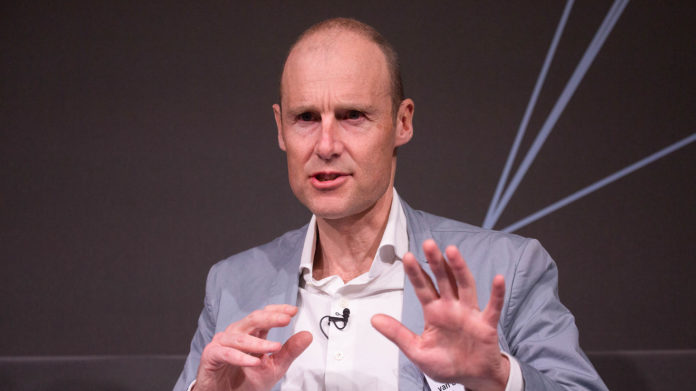As the recent tech IPO boom bleeds into payments, European financial-technology giant Adyen NV is getting in on the action.
The payment processor recently filed IPO paperwork and is expected to go public Wednesday on the Euronext Amsterdam exchange.
Adyen
ADYEN, +0.00%
is sometimes likened to PayPal, albeit on a smaller scale. At the midpoint of the company’s expected pricing range, Adyen would raise nearly €1 billion, or $1.1 billion, and be valued at €7.1 billion, or $8.3 billion. PayPal recently crossed back over the $100-billion market-cap threshold and operates in a variety of business areas, including peer-to-peer payments through its popular Venmo platform.
Don’t miss: PayPal’s iZettle purchase is likely to be followed by a lot more fintech M&A
While Adyen had a relatively low profile in the U.S. for much of its history, a recent deal put the company on the radar, at least for investors in PayPal Holdings Inc.
PYPL, -0.53%
. EBay Inc.
EBAY, +0.50%
announced earlier this year that Adyen would soon become its “primary partner” for payments efforts, an arrangement that will relegate PayPal to a lesser role on the eBay site.
That said, Adyen has been racking up high-profile customers for years, and it currently processes payments for the likes of Uber Technologies Inc. and Netflix Inc.
NFLX, +0.24%
.
Here are five things to know about Adyen ahead of its IPO.
Growing revenues, plus profits
Like most tech companies going public these days, Adyen has been posting solid revenue growth. It boosted revenue by 54%, to €1 billion, in the latest quarter.
Unlike a lot of its tech peers, however, the company has a history of profitability. Adyen recorded €71.3 million in net income in 2017, though that was down from €97.2 million in 2016.
Susquehanna Financial Group’s Jamie Friedman said recently that Adyen has better adjusted Ebitda (earnings before interest, taxes, depreciation and amortization) margins than many of its rivals. “Our checks suggest that Adyen’s platform is modern and fully integrated, meaning more efficient and better customer experience,” he wrote.
An impressive customer base
American consumers might be unfamiliar with Adyen’s name, but they’ve likely come across the company while making purchases from internet giants. Adyen lists Uber, Netflix, Etsy Inc.
ETSY, -3.61%
, Spotify Technology SA
SPOT, +0.52%
and Microsoft Corp.-owned
MSFT, -0.57%
LinkedIn as customers.
“Adyen primarily targets large global merchants,” wrote Friedman. “Based on their near-triple-digit growth rates — and their competitive case studies and commentary — Adyen appears to be competing effectively against companies such as PayPal, Global Payments Inc.
GPN, -0.21%
and WorldPay Inc.
WP, -0.44%
.”
Don’t miss: PayPal’s tech chief says AI will transform the payments experience
License to bank
One competitive advantage for Adyen is that the company has a banking license in Europe, which it received last year. The company explained in its prospectus that the license allows it to do direct settlement of funds from its account to the accounts of the merchants who use Adyen for payment processing. This enables the company to provide “enhanced performance and reliability,” the company said in its prospectus.
“Adyen differentiates itself in part through its tapestry of local banking charters,” wrote Friedman.
Various bank charters are a key area of interest for U.S.-based payments companies as well, though they aren’t so easy to come by. Square Inc.
SQ, -0.79%
, for example, applied for an “industrial loan company” charter late last year. If granted the charter, Square would be able to form an internal bank that could issue loans to Square’s business customers.
About that eBay deal…
Adyen may be becoming eBay’s new favorite payments company, but it may not have the same role that PayPal did on the site.
Under PayPal’s arrangement with eBay, made when the companies split back in 2015, PayPal became the merchant of record for transactions made on the online marketplace. That meant PayPal was responsible for things like customer service, tax collection and fraud loss — not eBay. In return, PayPal got a sizable “take rate,” meaning the portion of a transaction it could keep as revenue.
Lately, big marketplaces have decided that there are benefits to being the merchant of record and taking on extra risk in exchange for being able to keep a larger chunk of a given payment. EBay’s chief executive Devin Wenig said that the company hadn’t yet decided if it would be the merchant of record for transactions on the site, or if it would choose another method of becoming “a payment intermediary” under the Adyen deal. It will be worth watching the economics of this arrangement.
PayPal’s arrangement with eBay expires in 2020, but eBay can begin routing a certain small portion of payments through Adyen before then.
What’s in a name?
According to Adyen’s website, the company’s name means “start over again” in Surinamese. In another words, “deja vu,” said Susquehanna’s Friedman.
If all goes well with the company’s IPO, privately held payments peers might be hoping for some real-life instances of deja vu. Granted, Adyen is going public in Europe, but a successful IPO might make U.S.-based financial-technology unicorns feel more comfortable about pursuing public offerings of their own.
Among the big names that investors might want to see on the public markets is Stripe, which fetched a private valuation of $9.2 billion in 2016, according to the Wall Street Journal. Klarna, a Swedish startup, is valued at upward of $2 billion.
Some thought the recent IPO of GreenSky Inc.
GSKY, +1.18%
, which listed shares on the Nasdaq in May, could end the lull, though the stock’s debut has been rather muted.
Source : MTV














